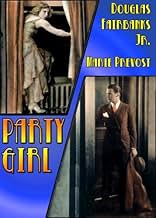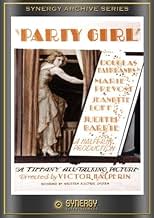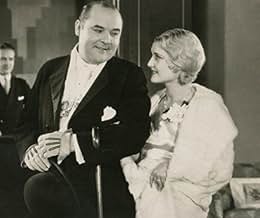Füge eine Handlung in deiner Sprache hinzuA cautionary tale. Ellen's past as a "party girl" is carefully hidden but may be exposed when another party girl tricks her fiance into marriage.A cautionary tale. Ellen's past as a "party girl" is carefully hidden but may be exposed when another party girl tricks her fiance into marriage.A cautionary tale. Ellen's past as a "party girl" is carefully hidden but may be exposed when another party girl tricks her fiance into marriage.
Earl Burtnett
- Orchestra Leader
- (as Earl Burtnett and His Biltmore Orchestra and Trio)
Eddie Bush
- Member of Biltmore Trio - Guitar
- (Nicht genannt)
Louise Carver
- Masseuse
- (Nicht genannt)
Paul Gibbons
- Member of Biltmore Trio - Steel Guitar
- (Nicht genannt)
Henry Roquemore
- Party Guest
- (Nicht genannt)
Empfohlene Bewertungen
In those days when Douglas Fairbanks, Jr. was playing any kind of role other than costume swashbucklers, the better to establish his own identity separate from his father, Party Girl was a typical role for him. In Party Girl he plays a rich young playboy during that era of wonderful nonsense who gets himself tricked into a marriage to a gold digging flapper played by Judith Barrie. If Party Girl did anyone's career any good it should have been Barrie.
Almeeda Fowler plays the procurer for her escort service of which Barrie is part. Various businesses use her girls for 'entertainment' and the girls hope to land a rich husband one way or another.
Party Girl is one primitive talkie and it also bares no resemblance to Party Girl made a quarter of a century later with Robert Taylor and Cyd Charisse. Fairbanks is pretty insipid and that doesn't wear well on him.
Lots of pre-Code double entendre in Party Girl. But overall it hasn't worn well over the decades.
Almeeda Fowler plays the procurer for her escort service of which Barrie is part. Various businesses use her girls for 'entertainment' and the girls hope to land a rich husband one way or another.
Party Girl is one primitive talkie and it also bares no resemblance to Party Girl made a quarter of a century later with Robert Taylor and Cyd Charisse. Fairbanks is pretty insipid and that doesn't wear well on him.
Lots of pre-Code double entendre in Party Girl. But overall it hasn't worn well over the decades.
There's nothing really shocking or even interesting about this precode, not even for 1930. It's basically about a ring of professional "party girls" that work for one particular madam and go around entertaining bored businessmen. Doug Fairbanks Jr. Is the partying son of the head of a manufacturing concern who crashes one of these parties one night and winds up with two souvenirs he could have done without - a huge hangover and a party girl wife. In the meantime, he's in love with his father's secretary who is a former party girl herself.
What is really notable here is the extremely bad acting. I've seen Doug Fairbanks Jr. In several of his early roles, and even if the films weren't that great, Doug's acting was OK. Here he really hams it up, along with the rest of the cast. I can only chalk it up to bad directing by Victor Halperin who made a number of unmemorable B pictures in the 30's, one of the exceptions to that being 1932's excellent "White Zombie".
The one strange thing that keeps happening in this film that I've never seen before is that everyone seems to think it's OK to drive your car into the service elevator of tall buildings and emerge on the floor of your choice. Fairbanks and his friends do it when they are crashing the party, and the police do the same thing at the end.
My verdict would be to pass on this film, even if you're a precode fan. It's neither cheesy nor entertaining enough to be worth your time.
What is really notable here is the extremely bad acting. I've seen Doug Fairbanks Jr. In several of his early roles, and even if the films weren't that great, Doug's acting was OK. Here he really hams it up, along with the rest of the cast. I can only chalk it up to bad directing by Victor Halperin who made a number of unmemorable B pictures in the 30's, one of the exceptions to that being 1932's excellent "White Zombie".
The one strange thing that keeps happening in this film that I've never seen before is that everyone seems to think it's OK to drive your car into the service elevator of tall buildings and emerge on the floor of your choice. Fairbanks and his friends do it when they are crashing the party, and the police do the same thing at the end.
My verdict would be to pass on this film, even if you're a precode fan. It's neither cheesy nor entertaining enough to be worth your time.
Wild Women! Bootleg hooch! Hot jazz! Sequins and furs! Blackmail! Suicide! This pre-Code cautionary tale opens with a typical disclaimer stating "It is our earnest hope that this film may arouse you..." Of course, they mean arouse your indignation to help eliminate such vices as you view in this exposé. Or, do they?
Pleasant juvenile Douglas Fairbanks, Jr., headlines along with a bevy of largely talent-free "party girls". Judith Barrie has some especially embarrassing scenes, leading one to wonder whether she may have gotten her part by being a party girl. Almeda Fowler, making her film debut as Maude "Don't call me Madam" Lindsay, and veteran actor John St. Polis put in decent performances adding some humor. The well regarded Earl Burtnett and His Hotel Biltmore Orchestra from Los Angeles provides suitable jazz accompaniment.
The best scene is the party where guests arrive in their automobiles via a service elevator directly to the party. The much commented upon perfumed fountain scene seems to have been excised from the version available from Alpha Video. Altogether, this is a pleasant diversion that pushes the envelope even for pre-Code Hollywood.
Pleasant juvenile Douglas Fairbanks, Jr., headlines along with a bevy of largely talent-free "party girls". Judith Barrie has some especially embarrassing scenes, leading one to wonder whether she may have gotten her part by being a party girl. Almeda Fowler, making her film debut as Maude "Don't call me Madam" Lindsay, and veteran actor John St. Polis put in decent performances adding some humor. The well regarded Earl Burtnett and His Hotel Biltmore Orchestra from Los Angeles provides suitable jazz accompaniment.
The best scene is the party where guests arrive in their automobiles via a service elevator directly to the party. The much commented upon perfumed fountain scene seems to have been excised from the version available from Alpha Video. Altogether, this is a pleasant diversion that pushes the envelope even for pre-Code Hollywood.
That scene of the big old car rolling onto the penthouse party floor as though it's an everyday occurrence really grabbed me. Then too, the guests acting like it's an everyday occurrence surprised me even more. Seems as though building elevators were big enough to lift any such cargo in those days. Plot-wise, the flick's got plenty of innuendo and filmy dresses, but never goes beyond that suggestive stage. Looks like even pre-Code had its unwritten limits.
Anyway, the interweaving of sexual scheming and big business likely pleased Depression-era audiences already made cynical by the Wall Street crash of '29. Fairbanks is the hormonal pidgeon of sexy Barrie's plotting, even though he likes the virginal Lott more. Nonetheless, there's riches to be made once the party girls expedite big money deals. So guys and gals do party-on. Meanwhile, Fairbanks' movie dad, St. Polis, makes a fittingly imperious business kingpin, lording it over his listless son. How the various schemes play out makes up the often ragged storyline.
Anyhow, the party girls are all richly upholstered and do well, unlike Fairbanks Jr who appears too bland to score beyond his illustrious family name. Overall, it's a revealing flick at a time when the free-wheeling 1920's were coming to an inglorious end.
(In Passing - on a more somber note: too bad actresses Barrie and Prevost had such sad early ends, {IMDB}. Happily, their contributions live on.)
Anyway, the interweaving of sexual scheming and big business likely pleased Depression-era audiences already made cynical by the Wall Street crash of '29. Fairbanks is the hormonal pidgeon of sexy Barrie's plotting, even though he likes the virginal Lott more. Nonetheless, there's riches to be made once the party girls expedite big money deals. So guys and gals do party-on. Meanwhile, Fairbanks' movie dad, St. Polis, makes a fittingly imperious business kingpin, lording it over his listless son. How the various schemes play out makes up the often ragged storyline.
Anyhow, the party girls are all richly upholstered and do well, unlike Fairbanks Jr who appears too bland to score beyond his illustrious family name. Overall, it's a revealing flick at a time when the free-wheeling 1920's were coming to an inglorious end.
(In Passing - on a more somber note: too bad actresses Barrie and Prevost had such sad early ends, {IMDB}. Happily, their contributions live on.)
If you want to study good acting, this film is essential for, well, the flip side of the acting craft. The most basic line readings are spectacularly awful. My personal favorite: a woman, facing two policemen with overbearing warnings, saying, "so - long pause - what?" To be fair, though, the script, just the basic dialogue, is horrible and the plot is just the bare bones material for an audience to get a peek at a lurid world of 'party girls' and Prohibition-era 'gin parties.' The double-meanings are just a step more lurid than the thinly-veiled plots of other "A" pictures. While prostitution is the main theme, the look into how the rich flaunt the alcohol ban is sure to have titillated an audience of the era. The 'perfume' bath given to one of the girls is strongly suggested to be gin. And one cop notes before questioning a girl that the guilty go for a bottle before being interrogated. The class depictions in a film shot at the onset of the Depression also are stark. The rich drink and carouse with poor girls on the margins of society who, as the opening title says, want only to earn a living in a "decent" way. The message to women is clear enough: the workplace is no place for decent gals.
Wusstest du schon
- WissenswertesThe film holds the record for longest UK film ban. The BBFC banned the film in 1930. It was finally released, with a PG rating, in 2003.
- Zitate
Diana Hoster: [answering phone from a massage table, butt-naked--literally; this is pre-code] Di Hoster speaking, in the flesh.
- VerbindungenFeatured in Hollywood Uncensored (1987)
- SoundtracksOh! How I Adore You
Words and Music by Harry Stoddard and Marcy Klauber
Copyright 1930 by Shapiro, Bernstein & Co
Top-Auswahl
Melde dich zum Bewerten an und greife auf die Watchlist für personalisierte Empfehlungen zu.
Details
- Laufzeit1 Stunde 7 Minuten
- Farbe
- Seitenverhältnis
- 1.37 : 1
Zu dieser Seite beitragen
Bearbeitung vorschlagen oder fehlenden Inhalt hinzufügen





















